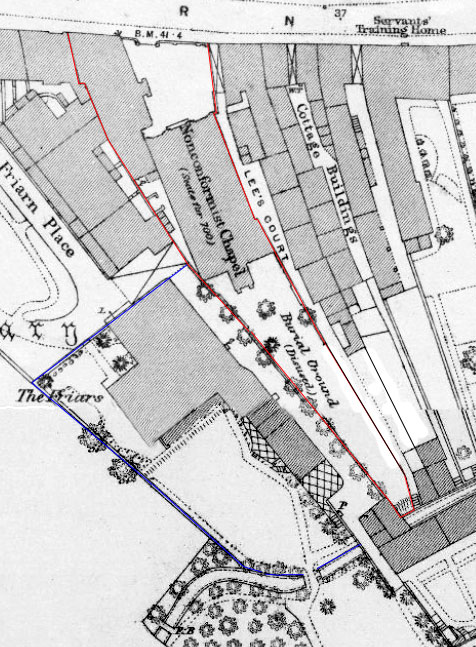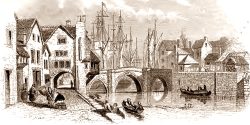The Friars was a grand house in Friarn Place, off of Friarn Street. Does not seem to appear on the 1819 Town Plan, but is built by the time of the c.1854 Town Plan. It was possibly contemporary with Friarn Lawn, or a little later, as it depends on the private roadway for access. Possibly the home of John Bowen built c.1820s after his return to Bridgwater?
Prior to 1877 it was the home of Joseph Richard Smith, who was Mayor in 1868, 1873 ad 1874.
After Smith’s death in 1877, the house was put up for action, and was purchased by James Leaker (Mayor of Bridgwater at the time) for £1000, which was considered a low price (Somerset County Gazette, 10 November 1877). In 1878 Leaker put the house was put up for let, and the advertisement mentions lawn, greenhouse, conservatory, kitchen garden, stabling and coach house, with a total of ten bedrooms (Bridgwater Mercury, 27 March 1878).
In the 1891 census the house was occupied by George Lovibond, 43-year-old Solicitor and his family.

The rear seems to have had some connection to allow access to the Tannery.


From 1906 the Friars seems to have been used as a home for epileptic girls (Weston Mercury 10 November 1906).
In 1937 an A.E. Best is recorded as resident of the Friars.
In October 1942 a Miss Mabel Lucy Laver died in the house, who was 52 years old (Taunton Courier and Western Advertiser, 2 October 1943).

Durleigh Brook in dark blue.
Sion Chapel site and burial ground now denoted by S(alvation) A(rmy) Citadel.
Source: collection Dr P E Cattermole
In 1959 the Friars was the headquarters of the Pantomime Society, and rehearsals were held here (Taunton Courier and Western Advertiser, 12 December 1959)

Friarn Lawn with veranda on left still standing.
Extreme left (west) is Old Armoury Garage with Unitarian disused burial ground behind, all now demolished and redeveloped.
Centre foreground The Friars.
Photographer standing in Broadway, looking north.
Date of photographs unknown, but presumed early 1980s (pre 1983).

View slightly further to east. Higher wall to right is over the Durleigh Brook.

Dr Peter Cattermole 1 September 2007
